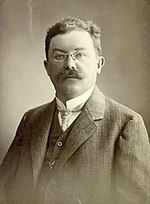Willibald Nagel, Date of Birth, Place of Birth, Date of Death
TweetWillibald Nagel
German physiologistAbout Willibald Nagel
- Willibald Nagel (19 June 1870 – 13 November 1911) was a German physiologist, best known for his work in the field of sensory physiology. Born in Tübingen, Nagel earned doctorates in sciences (1892) and medicine (1893), obtaining his habilitation two years later at the University of Freiburg as an assistant to physiologist Johannes von Kries.
- In 1902 he became an associate professor in Berlin, where he was appointed head of the sensory physiology department in the institute of physiology.
- In 1908 he was named professor of physiology at the University of Rostock.His primary areas of work involved physiological optics, physiology in regards to sense of smell and taste, studies of position and motion sensations and the physiology of the vocal organs, to name a few.
- He is best remembered for the development of ophthalmic instruments and aids—he built an adaptometer for measuring dark adaptation of the eyes, an anomaloscope for the study of color blindness, and introduced the so-called Nagelschen Farbtäfelchen (Nagel's color tablet) for the testing of color perception.With Hermann Ebbinghaus, he was co-editor of the journal Zeitschrift für psychologie und physiologie der sinnesorgane.He died in Rostock.
Read more at Wikipedia
See Also
- Famous People's Birthdays on 19 June, Germany
- Famous People's Birthdays in June, Germany
- Famous university teacher's Birthdays on 19 June, Germany
- Famous university teacher's Birthdays in June, Germany
- Famous physiologist's Birthdays on 19 June, Germany
- Famous physiologist's Birthdays in June, Germany


 Date of Birth:
Date of Birth:  Place of Birth: Tübingen, Baden-Württemberg, Germany
Place of Birth: Tübingen, Baden-Württemberg, Germany